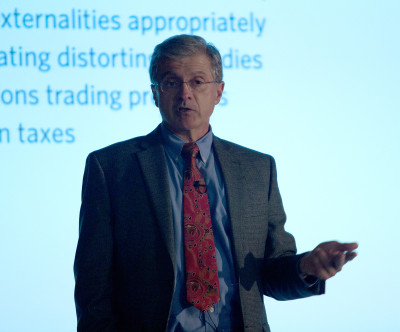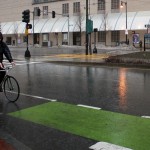
Boston University has achieved its energy-related goals because the Northeast region has become greener, moving away from coal and toward natural gas, Anthony Janetos, director of the Frederick S. Pardee Center for the Study of the Longer-Range Future said during a Tuesday panel on climate change.
Janetos, in addition to Dean of the Frederick S. Pardee School of Global Studies Adil Najam and Madhu Dutta-Koehler, a professor of city planning and urban affairs, all emphasized the effects of climate change, focusing on mitigation and adaptation during the panel, which was hosted by the Board of Trustees’ Advisory Committee on Socially Responsible Investing.
Approximately 40 faculty members, students, guests and committee members were in attendance at the conference auditorium in the George Sherman Union. The panel marked the fourth community forum hosted by the committee, aimed at helping the ACSRI determine whether or not to recommend divestment from fossil fuels to the Board of Trustees.
The three panelists took diverse approaches to the issues of climate change. Janetos focused on the ways in which the United States is a “virtual laboratory on how to deal with greenhouse gas emissions” and how different methods of mitigation and adaptation have been implemented throughout the country.
Najam, stateside for just a day after returning from the COP21 Paris Climate Summit, emphasized climate change as an issue that must be dealt with on a global level. He stressed the global impact of every individual action and the need for a global response.
“When you think global, you get all these opportunities that you don’t get when you think local,” he said.
Dutta-Koehler chose to approach the subject of climate change from an architectural perspective, focusing on the power of urban design and the important role that cities play in both dictating the future of climate change and in dealing with the current effects of global warming.
During a question-and-answer session following the panel, an attendee asked the panelists if ACSRI should decide not to divest, and what message it would send to BU about its position on climate change.
Janetos said the goal of their presentations was to inform the BU community and add to the climate discussion the university has been engaged in. He said the question of divestment from fossil fuels was more of an issue of “when” than “if.”
“If you look at the criteria the committee said it’s going to use, one of those criteria boils down to, ‘Are you on the right side of history?’ And there I think it’s very clear this is a very serious issue, more than an environmental issue,” he said. “There’s very little serious debate as to what needs to happen as a matter of public policy.”
Several attendees said they were appreciative of the panelists’ commitment to climate change education, as well as the factual approach to the controversial issue.
BU Sustainability Outreach Coordinator Lisa Tornatore said she was aware of how the decisions of the ACSRI would affect BU’s sustainability effort.
“I’m interested in this personally and for sustainability@BU as well, and the fact that whatever the university and the trustees choose to do will affect how we communicate sustainability on campus,” she said. “I think the information presented is important for an informed education discussion about climate change, which is really at the root of the divestment issue.”
Les Kaufman, a professor of marine biology and a member of the Pardee Center said he was pleased the talk was successful in educating both students and faculty on the issues facing the university and the world, but said he felt that the conversation was lacking in student engagement.
“My problem is that the committee is not communicating back about what they’re doing, but I would feel a little bit better if along the way this conflict of pedagogy was acknowledged,” he said. “Ultimately, we’re not going to be invested in fossil fuels because there won’t be any. This is not a question about whether we invest in fossil fuels or not this is a question about when we pull out. And pulling out sooner sends a message, but there are many ways to send a message.”




